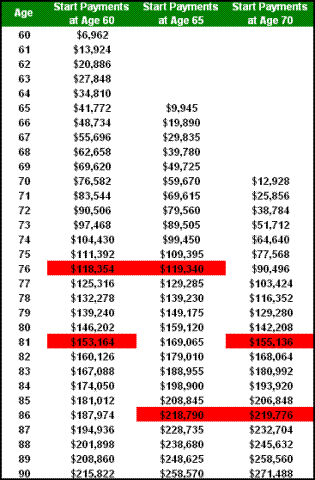The Canadian Pension Plan (CPP) is a retirement program from which contributing Canadians may receive payments at the age of 60 or upon a disability. The program, however, does not start immediately paying you upon retirement, disability or at the age of 60 because you must apply for payments. While deciding when to take CPP payments is a personal choice that you should make with a financial adviser, from a financial point of view it, may be wise to take these payments as early as possible.
Although you are not guaranteed to receive the maximum payments from the pension program, our example uses the maximum payment an individual can receive (as of 2005). Table 1 illustrates the maximum payments for the starting ages of 60, 65 and 70.
 Table 1
|
Table 1 shows that the older you are, the more money you receive each month and each year. However, this does not tell the whole story; we need to look at the total that would be withdrawn over time. Table 2 shows three situations: taking contributions starting from the age of 60, 65 and 70 until the age of 90. The values in the table are simply the growing total value of the payments – without the contributions being invested.
 Table 2
|
Table 2 shows that by taking CPP at the age of 60, you will have received a total of $215,822 by the age of 90. By taking it at 65 you will have a total of $258,570 and by taking it at 70, your total will be $271,488 by the age of 90. It is clear in the table that the later you take it the more you end up receiving in total if you were to live to 90.
However, the most interesting point the table shows us is how long it takes for those starting at the later ages (65 and 70) to catch up to the earliest date (60). If you were to take CPP at the age of 65 it would take you 11 years (when you are age 76) to catch up to the total value received by someone who had taken it at 60 years of age. If you started taking amounts at age 70, it would take 21 years (when you are 81) for you to catch up to someone who took payments at 60. This simple look at the CPP program does not take into consideration the investment of contributions but if the contributions were invested but it would take even longer for the 65 and 70 values to catch up to the value achieved by taking CPP at the age of 60.
The implications of what we show you here boils down to whether you want more now or more later. The higher monthly, annual and total payments received by those who start later may seem like a reason to hold off in taking your CPP payments. But, it takes many years to collect the same amount as someone who starts early, and there are no guarantees that you will live that long. If are not sure of what is best for you, it is wise to consult with your financial planner about taking the payments early.